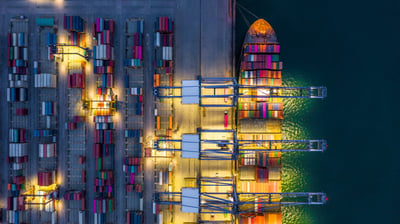Trade buzz: What is friendshoring? (And should you care right now?)
Over the past three years, we’ve been paying significant attention to supply chain processes across industries. From pandemic disruptions to an international war, businesses across all points of the supply chain are striving to mitigate further potential chaos. Beneath all the surface chaos, the entire nature of our globalized economy hangs in the balance.
What’s the buzz?
Shipping goods in the present economy means shipping goods in a sea of uncertainty. From unpredictable and dangerous weather events to the pending possibility of mandated carbon footprint reporting to political instability in the world, importers are feeling pushed to iterate and innovate in unprecedented ways.
On top of all this, the media continuously buzzes around your head. When a term lasts beyond the 24-hour news cycle and picks up steam, does that mean it’s time to pay attention?
This is what’s happening with friendshoring. Let’s take a look at the term, why it’s so buzzy right now, and more importantly, what (if anything) you need to do to prepare.
Shoring up the supply chain
There are many ways to secure your supply chain in the face of uncertainty. Options like onshoring (keeping your supply chain processes close to home) or nearshoring have become attractive options to help keep goods moving for companies. Now, we have a potential new “shoring” option: friendshoring.
Friendshoring, also known as allyshoring, is when a company decides to move any part of its supply chain operations to be done in a country that shares the values of the company or the company’s home country. In the simplest sense, companies in democratic countries may choose to reorganize their supply chain processes, from manufacturing to shipping, with other democratic countries.
For example, a U.S. furniture maker working with Russian lumber may choose to move their manufacturing to Canada from Russia in order to avoid doing business with an authoritarian government. Interestingly, instead of profit driving the choice, values and “friendly” international relationships drive the decision.
Generally, in these early days of discussion, western countries are drawn to the concept as a way of avoiding disruptions caused by geopolitical issues, while countries like the People’s Republic of China are interested in reducing their reliance on Western technology.
The concept is largely being championed by the U.S., with the support of the EU, and as you might imagine, friendshoring is certainly not without its potential flaws. This is why it’s essential to remember when you see terms flying around the media to hold them loosely. This is not policy—at least, not yet.
Whither globalization?
As importers, the dynamism of both the logistics industry and globalization is not lost on you. It’s also more than clear that big change is occurring. Some speculators believe we are transitioning away from globalization, indeed, “de-globalizing” and if that happens, you can bet the supply chain will be the “canary in the coal mine”. It’s possible policies like friendshoring may mitigate this and allow trade to maintain a global element.
Still, just how viable is friendshoring? It is clear that not every country has the resources to make every item on their own. Among some of the industries that are poised to grow in the future (think: semiconductors, telecommunications, etc.), China already has a strong foundation. For example, China controls 64% of polysilicon material worldwide (the raw material used to make solar ingots and wafers), while the U.S. has 10% of the market share. After polysilicon are solar ingots and solar wafers, of which China's share of that is nearly 100% worldwide.
Beyond this, not every country may agree to instituting a friendshoring policy as the foundation of their international trade.
Ultimately, whether or not friendshoring revives the global supply chain or the supply chain fully de-globalizes, only time will tell.
Don’t act on speculation
Whenever a new idea gets a lot of press, it’s easy to get panicked and think you need to take action. But reacting to news does not fortify your supply chain. Nor does getting caught up in speculation.
The best way to manage uncertainty is to maintain flexibility while seeking to secure your systems and processes in the way that aligns with your company’s interests and values. While it never hurts to take a closer look at your suppliers, especially in light of forced labour bans in Canada and the U.S., making rash moves like pulling all operations out of China may be hasty. Also, remember that Canada already enjoys 15 trade agreements with 51 nations —agreements that are worth taking advantage of while they exist.
Will friendshoring become the next big thing in trade? Perhaps, perhaps not. If anything, the concept of shifting trade to organize around values rather than to serve a profit motive may be the brightest glimmer of hope this trend is offering. That’s the real shift the world needs right now.
Partner with experience
Ultimately, the best way to manage a robust supply chain in the face of uncertainty is to surround yourself with the right people. In a world that is continuously changing, you need a partner with longevity and experience. Customs consulting is what we have been doing for well over half a century. Take advantage of the wisdom that comes with experience and connect with us today.

